Expert visits, short-term on-site training
Description
- Publication database of RSU – task leader RSU
- Coordinating institution RSU will introduce in the reporting tool on the Participant Portal by month 2 of the project all publications (in the particular field of research) of RSU during the three years preceding the start date of the project. Task leader – RSU.
- Selection and approval of experts for on-site trainings
- Expert scientists of the CORE Swedish (MTC/KI) and Polish (DGB/LU) teams will perform on-site research trainings at RSU and KIEPOR. Each CORE center will provide three experts. Candidates for this form of teaching will be identified, and approached. Candidates agreeing to participate will be presented to Steering Board and assigned to the task after Steering Board approval. and approved by the Steering Board. Expert researchers from MTC/KI and DGB/LU performing on-site training will get full coverage of travel and subsistence expenses, but no remuneration for the teaching efforts. Expert visits will be arranged in lines with the plan elaborated in WP1.
- Visits of expert researchers to perform on-site training at RSU and KIEPOR
- Maximum duration of such training will be 4 weeks. Subject for the experimental trainings will be selected steps in design, in vitro testing of cancer vaccine candidates based on naked DNA, their formulation with complexes with dendrimers with or without adjuvants, delivery into laboratory animals, follow of the delivery and in vivo expression, monitoring of the induction and expansion of the specific immune response by B- and T-cells of experimental animals, mostly mice. In parallel to experimental trainings, in-coming experts will be engaged in teaching for Master and PhD students in the field of tumour biology, oncology, mechanisms of tumour suppression, vaccines and vaccination, principles of immunotherapy. The exact content of wet and dry training, other educations activities, target trainees, and time frame for training will be defined by the individual expert plans. As in WP2, VACTRAIN foresees reagent and material support of the expert visits by allocating finances in part to accepting and in part to sending institutions. In-coming specialist would be provided with documents necessary to transport the required materials, not available on site, to either bring them or send them to the site of training by post. The courses will be concluded by written reports of the experts and of the allocated trainees evaluating quality of the training and defining its main achievements.
- Second round of trainings of selected methodologies at CORE centers
- Second round of training of selected methodologies will be performed individually by inviting trainees to CORE excellence centers to train experimentation in the most modern settings, in lines with the road map elaborated in WP2. The project foresees the total of 9 month of trainings, split as five person/month for RSU, and four person/month for KIEPOR. Trainees candidates will be selected by team leaders together with experts involved in local on-site teaching, and will form the nucleus for the immunotherapy task force. Trainings will follow individual plans and time schedules elaborated between the RSU and KIEPOR team leaders, expert teacher and the trainee.
- Analysis of the short- and long-term outcomes of staff trainings
- The start-up for the activity will be written reports of the experts and of the trainees allocated to individual training, both evaluating training quality and defining its main pros and cons. Reports will be analyzed and used by the Steering Board to improve the quality of personal on-site trainings. Coming in close contact with the staff of RSU and KIEPOR institutions, will allow the experts to perform the inventory of local infrastructure and local human resources, defining and assembling core groups at RSU and KIEPOR which would by the end of the project constitute the anti-cancer immunotherapy task force. Candidates into the task force will be promoted to further educational and training activities within VACTRAIN.
Objectives
- Sharing experience, demonstrating and transferring know-how to increase the research capacities of Latvian (RSU) and Ukrainian (KIEPOR) researchers of all levels;
- Reinforcement of primary experience obtained in the training courses by individual trainings in “real life” research;
- Establishment of personal contacts between experts and WIDENING/ASSOCIATED country research teams, as a basis for consulting, joint investigations, (co)supervision of projects, applications for collaborative projects in H2020.
Deliverables
- One-page statement about data entry into participant portal on publications in the ME/CFS (and closely relevant) field in the past 3 years (M2)
- Selection and approval of CORE expert group (M2)
- Expert visits plans for month 1-12 (M2)
- Expert visits plans for month 13-24 (M13)
- Expert visits plans for month 25-36 (M25)
- Expert visit from MTC/KI #1 (by M12)
- Expert visit from MTC/KI #2 (by M24)
- Expert visit from MTC/KI #3 (by M36)
- Expert visit from DGB/LU #1 (by M12)
- Expert visit from DGB/LU #2 (by M24)
- Expert visit from DGB/LU #3 (by M36)
- Defining the candidates for individual trainings in CORE centers (M6)
- Individual trainings in CORE centers, 3 person/month year 1 (by M11)
- Individual trainings in CORE centers, 3 person/month year 2 (by M23)
- Individual trainings in CORE centers, 3 person/month year 2 (by M34)
- Analysis of the training quality and outcomes yearly and in final report (M35)


